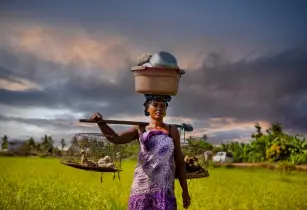People in the southeastern Ikongo district of Madagascar have beenfacing acute food shortages and struggling with malnutrition after harvests were destroyed in the 2022 cyclones
The Integrated Food Security Phase Classification (IPC) analysis of January 2023 shows that more than a quarter of the population in the Vatovavy-Fitovinany and Atsimo-Atsinanana regions are currently experiencing acute food insecurity. Médecins Sans Frontières (MSF) is currently supporting 24 health facilities in hard-to-reach places, as well as treating patients for malnutrition in five health centres in Ikongo district. As of early January 2023, a total of 2072 children under the age of five were being treated for severe acute malnutrition, out of which, nearly half were admitted to MSF nutritional programmes.
Madagascar is one of the countries at most risk from climate change and faces extreme weather events at regular intervals. In early 2022, the southeast region was hit by two consecutive cyclones – Batsirai, on the 5 February and Emnati, on 22 February – leaving a massive trail of destruction in their wake. As a result, several trees were uprooted, crops were destroyed and local agriculture was heavily affected.
With most of the crops destroyed, people lost both their food stocks and their sources of income. In the Vatovavy-Fitovinany and Atsimo-Atsinanana regions, almost the entire agricultural area has been affected including more than half of the food crop. Although food insecurity is not new in Madagascar, several factors have further impacted health problems among the most vulnerable. In addition to the cyclones, intermittent rains and persistent crop failures, limited access to health care and COVID-19 have also fuelled existing food insecurity.
“Repeated climate shocks aggravate hardship for communities who have to build back every time,” said Brian Willett, MSF Head of Mission in Madagascar. “Few humanitarian organisations work in the southeast and we are looking at scaling up our activities,” he added. Today, MSF is supporting 29 local health facilities in Ikongo district with nutritional care, bringing therapeutic foods and training health staff to diagnose and treat malnutrition. Moreover, MSF teams are also providing primary health care to communities in the coastal area of Nosy Varika and sanitation and water infrastructure in the Androy region.





